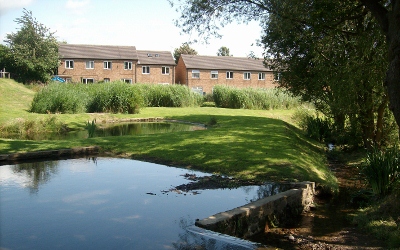- Delivering SuDS
- Using SuDS
- Background
- SuDS principles
- Benefits of SuDS
- Benefits of SuDS
- Why developers should choose SuDS
- Flood risk management
- Water quality management
- Biodiversity & ecology
- Amenity
- Air quality
- Building temperature
- Carbon reduction and sequestration
- Crime
- Economic growth
- Enabling development
- Flexible infrastructure/climate change adaptation
- Groundwater recharge
- Education
- Health and well being
- Pumping wastewater
- Rainwater harvesting
- Recreation
- Tourism
- Traffic calming
- Treating wastewater
- SuDS components
- SuDS components overview
- Source control
- Swales & conveyance channels
- Filtration
- Infiltration
- Retention & detention
- Wetlands
- Inlets, outlets and control structures
- SuDS performance & monitoring
- Delivery
- The costs & benefits of SuDS
- Adoption & maintenance of SuDS
- Legislation & regulation
- Design guidance
- Retrofitting SuDS
- Drainage exceedance
- Home
- Delivering SuDS
- Retrofitting SuDS
- Why retrofit?
- Why change?
Retrofitting SuDS - why change?
New development offers an important opportunity to manage surface water better than has been done traditionally. It requires early consideration of drainage and SuDS in the development planning process.
However, new development forms only a small part of the current urban areas. If retrofit SuDS can be incorporated into existing developed areas, then the opportunities for delivering sustainable solutions that offer multiple benefits will be much greater.
Continuing our current approach to managing surface water in our existing urban areas, through the building and upsizing of traditional systems such as sewers and underground storage, is perpetuating unsustainable solutions that are not adaptable to a changing future.
There are many opportunities for taking a different approach to managing surface water that fits into the current urban landscape better than before, whilst also addressing the issues of flood risk and water quality management. SuDS are known to be more adaptable and flexible than traditional solutions, allowing future modification to cope with climate and other changes in urban areas.
Retrofitting SuDS can potentially help solve some of the flooding and water quality problems that are faced today. Such measures provide a more joined up approach to managing surface water across wider areas, supporting the water cycle as a whole, helping to green urban areas and generating multiple benefits in-line with an ecosystems services approach.
SuDS can also be cheaper than traditional solutions, and nearly always provide more benefits. In particular, those that use green infrastructure can improve the urban environment and air quality, enhance biodiversity and create better places to live. Many examples from around the world also show that reducing surface water from entering an existing drainage system, through retrofitting, can be more cost effective than increasing drainage capacity (eg Green City, Clean Waters in Philadelphia and the Green Streets approach in Portland Oregon).
Read more on:



